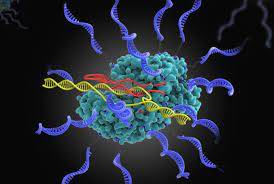CRISPR Technology: Editing the Blueprint of Life
In the realm of genetic engineering, CRISPR-Cas9 has emerged as a revolutionary tool, offering unprecedented precision in the manipulation of the genetic code. Commonly referred to as "genetic scissors," CRISPR technology allows scientists to edit specific DNA sequences with remarkable accuracy, holding the promise of transformative breakthroughs in medicine, agriculture, and beyond.
Precision at the Molecular Level:
CRISPR, which stands for Clustered Regularly Interspaced Short Palindromic Repeats, is a natural defense mechanism found in bacteria. Scientists harnessed this system, particularly the Cas9 protein, and repurposed it as a molecular scalpel. The technology allows researchers to precisely target and modify specific genes within an organism's DNA.
Medical Marvels:
In the medical field, CRISPR has opened new avenues for treating genetic disorders. The ability to edit faulty genes responsible for hereditary conditions holds the potential to eradicate diseases at their root. Researchers are exploring CRISPR's applications in treating conditions like sickle cell anemia, muscular dystrophy, and certain types of cancer, ushering in an era of personalized medicine.
Agricultural Advancements:
Beyond healthcare, CRISPR technology is revolutionizing
agriculture. Scientists are leveraging CRISPR to develop crops with enhanced
resistance to pests, improved nutritional content, and increased yields. This
precision breeding tool offers a sustainable approach to address global food
security challenges.
Ethical Considerations:
While CRISPR technology holds immense promise, it also raises ethical concerns. The power to manipulate the genetic code brings forth questions about the potential misuse of this technology, including the creation of "designer babies" with predetermined traits. The scientific community is actively engaged in discussions to establish ethical guidelines and regulations to ensure responsible use.
Future Horizons:
As CRISPR technology continues to evolve, so does its potential. Beyond editing genes for therapeutic purposes, researchers are exploring applications in creating bioengineered organisms for environmental conservation and developing innovative solutions for combating infectious diseases.
In conclusion, CRISPR technology represents a paradigm shift
in our ability to manipulate the blueprint of life. Its precision, efficiency,
and versatility make it a transformative tool with the potential to reshape the
fields of medicine, agriculture, and biotechnology. As scientists navigate the
ethical considerations and unlock the full potential of CRISPR, the technology
stands as a testament to the boundless possibilities of human ingenuity in
rewriting the story encoded in our DNA.



No comments yet
Be the first to share your thoughts!